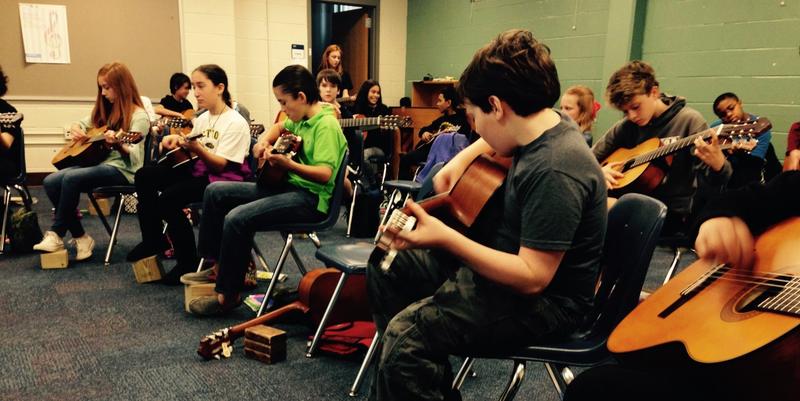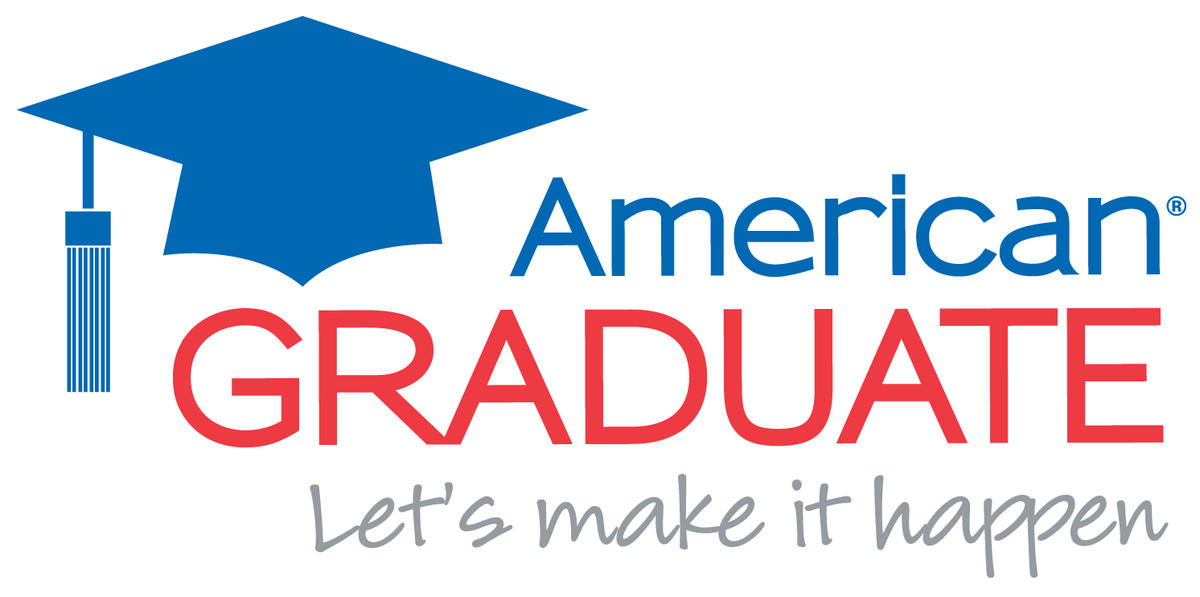This story is part of WABE and American Graduate’s Advancing Atlanta: Education series. For more stories, click here.
At the beginning of this school year, Atlanta Public Schools reduced its number of music teachers by a third. There are now about 40 music teachers in the district.
Even with fewer teachers, music education inside Atlanta’s schools does have variety. Guitar classes are offered at several high schools and one middle school.
That middle school is Sutton Middle School, which is divided into two campuses. At the sixth-grade campus, each guitar class has about 35 students under the instruction of Robert Pethel.
During one class last December, Pethel led the students through the guitar workbook, which was projected on a screen at the front of the room. Student Kevin Ferreira explained what the workbook is: “It’s basically a guitar book that has songs that are easy enough to play.”
From the workbook, students played short exercises while Mr. Pethel played the accompanying teacher part. The exercises are called things like “Troubadour Song” and “Flamenco Dance.” They also played simplified versions of Pachelbel’s “Canon in D” and Beethoven’s “Ode to Joy.”
Pethel recently became Dr. Pethel after defending his dissertation last month as part of a PhD program at Georgia State University. His area of study was guitar education. For his research, Pethel investigated six exemplary teachers.
“They were all so different in what they taught,” he said. “But one thing that they all did, in their own way, was that they spent a great deal of their class time in a performance-based activity. In other words, they are doing active music-making experiences.”
Pethel does as much “active music making” as possible in his class. With his sixth-graders, they play through the workbook, only to stop to work on tricky note sequences and improve the character of the exercise.
Pethel’s research also showed that the quality and depth of guitar education across the United States, Georgia and even Atlanta’s schools have a lot of variation.
“Guitar education in the U.S. is kind of outside the traditional branches. You have band, orchestra and chorus as your mainstays, and guitar education has emerged as an alternative. A lot of teachers teach, but instruction is a mile wide and an inch deep.”
Along with educating the next generation of musicians, Pethel’s ultimate goal is to create a cohesive guitar program throughout the entire Atlanta school system.
There isn’t much guitar teacher training for music educators. At most schools, guitar is taught by teachers who specialize in band, orchestra or chorus, not guitar. Pethel, on the other hand, is a guitar education specialist. He and other guitar specialists train music educators through a program called Teaching Guitar Workshops.
“During the summer, we have these workshops all over the country, where these music teachers come in and learn how to teach guitar hands-on,” he said. “They bring their instruments, they play all day, they have a ton of fun, and we go through so many of the available method books and resources that are out there.”
The idea of offering guitar class in schools started in the late 1960s, but guitar never became as ubiquitous as band, orchestra and chorus.
In Atlanta, principals elect how to allocate their resources for music. Every school must have some sort of general music offering. All middle schools also have to have band. Sutton Middle School has band, chorus, orchestra and guitar.
Principal Buck Greene is a staunch supporter of all sorts of programs at Sutton: athletics, service and leadership activities, and visual and performing arts. He said he likes having guitar at his school because he wants as much variety as possible.
“I know that my personal philosophy is to nurture that whole child,” he said. “We want to pay attention to all parts of the child, and we want to offer enough of a variety that we pay attention to every type of child, where their forte may lie.”
At Sutton Middle School, students are assigned guitar class, but the sixth-graders have enjoyed the class, even if they did not choose it.
“When I first took this class, I thought this is so boring, but then I got deeper into the core of guitar and I was like, this is so fun,” said Anna Greer, a student in the class.
In the United States, the guitar is the one of the most popular instruments to play – second only to the piano. It’s melodic, harmonic and rhythmic all at the same time and can be a solo instrument. It appears in all sorts of musical genres from classical to pop to blues to metal. So, guitar has a certain point of access that an oboe, French horn or cello might not have with students.
“There is a growing collection of guitar orchestra music that’s being written to meet the needs of these emerging guitar programs, but I believe that’s not why people sign up to take guitar,” Pethel said. “They want to play a Beatles song or something they are more interested in.”
Some students, like Nadia Hartman, want to take guitar out of the classroom.
“My one friend knows how to play piano and the other knows how to sing, so we’re going to start our own band,” she said.
In his class, Pethel makes sure to teach students how to read music and also how to play by ear.
“I’m trying to bridge those two things and, if you favor one of those two, I think you have a warped sense of what being a musician could be,” he said.
Pethel emphasized that guitar is not superior to the usual band, orchestra and chorus classes. It is just a different way of learning that works better for some students.
The new federal education act, Every Student Succeeds, designates music a core subject, but it’s too early to see how that affects music classes in APS.
Pethel is enthusiastic about the future of guitar. Last year, metro Atlanta had its first guitar gathering across school districts, where small and large ensembles played in front of a jury. Pethel said that he has more momentum to create a cohesive guitar program under the new fine arts coordinator.
Back in class, the Sutton sixth-graders finished up with some fun. They rehearsed a guitar ensemble arrangement of rapper B.o.B’s song “Airplanes.” At the end of the semester, Pethel was proud of his students.
“If someone had told you at the beginning of the semester that you’d be playing and reading this music, would you believe it?” he asked. “You’ve taken this class to the next level.”
Atlanta Public Schools’ spring semester started this week, and Pethel has a whole new batch of beginners.
This story is part of American Graduate, Let’s Make it Happen, a public media initiative made possible by the Corporation for Public Broadcasting.










